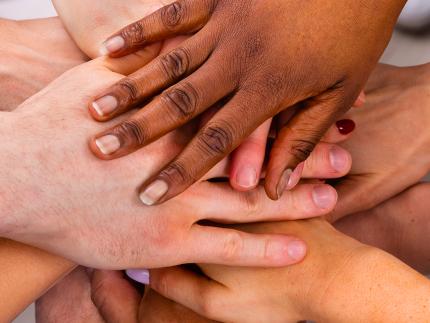Dignity Team Launches

The Christian Reformed Church in North America has a new team available to help anyone who has experienced an abuse of power within CRC circles. Dubbed the Dignity Team, this group of individuals was appointed by the Council of Delegates and endorsed by Synod 2022 as one of several actions designed to make our churches, classes, and ministries safer spaces for everyone.
“Respect for the dignity of each person, as equally created and called by God to contribute to the life of the church, is one of the core stated values of the CRC,” explained the Abuse of Power Ad Hoc Committee in their report to Synod 2021. “When incidents happen that erode, infringe upon, or violate dignity and thereby do harm to someone, there needs to be a place to go for help to address the wrong done and to restore respectful relationships.”
While several channels already exist for addressing abuse – such as human resources policies for staff members of CRCNA ministries, and complaint-filing processes to a council or classis for employees of congregations -- there are some situations in which these channels might not be appropriate or might not meet a particular need. In such situations the Dignity Team would step in in a pastoral way.
The CRCNA Dignity Team exists, as explained in the report, “to respond to less tangible and less clearly defined abuses of power that occur within CRC circles and fall between or outside the scopes of the systems addressed elsewhere” in the CRCNA’s system to prevent abuse of power.
This might mean that the Dignity Team is a point of first contact for someone who experiences a situation and isn’t sure if it was an abuse of power. It might also be a place to go if someone feels that formal channels aren’t available to them or won’t be able to hear the complaint in an unbiased way.
“Responses would be restorative, problem-solving, not punitive, or not requiring heavy documentation and complex processes, and so on. This role will have a preventative function through presence and helping to set a tone of respect, as outlined in the core values of the CRC. If persons approach the committee with matters that should be addressed by other existing processes, they would be referred to the appropriate contact points, not add a layer to them,” said the report.
Here are a few examples that the report provided to help explain when the Dignity Team might be needed:
- “Abuse of power incidents across regular systems of accountability
“A church elder/member with strong views and a domineering style repeatedly calls and verbally belittles a staff member in the CRCNA office. In some cases comments on web-based platforms hound the person and are less-than-respectful but pass minimum standards. While direct conversation between the two parties might be preferred, as outlined in Matthew 18, the difference in real or perceived power makes that unlikely to happen. The supervisor might intervene, but that can be diplomatically difficult in the context of a ministry plan that gives high priority to staff being responsive to local churches. The situation could be escalated to the executive director, but that can also be diplomatically challenging and might not be effective, given current attitudes toward ‘Grand Rapids’ staff. In reality, the situation is often allowed to fester, erode staff morale and productivity, and in some cases expand the problem.
“Technically, the staff person could contact the member’s church council, but that is not likely to happen on their own—and chances of effective response are limited, given the history of church council responses in Safe Church cases.
“In a case like this, the best outcome might be a call to the Dignity Team, who would be in contact with both parties and facilitate constructive discussion that might end in ‘agreeing to disagree, but with respect for one another.’ At minimum, the outcome would end the ‘harassment’ that harmed the parties involved.” - “Cases that should not be ignored but may not warrant attention in one of the formal complaint channels
“Both women and members of the BIPOC community provided evidence to the Abuse of Power committee about situations that were hurtful and not forgotten. They wished they could just approach the offending party and name the offense, hoping for a change of behavior in future similar contexts. One example is the ‘weaponizing of the Church Order’ in classis meetings: under the guise of long experience, a white elder uses the Church Order to effectively silence a younger black leader and leaves an impression that the black person is stupid or less Reformed. Often nothing can be done ‘in the moment’ because statements are not technically out of order. The damage to respectful culture is done, with no evident recourse. Women reported incidents of having their authority undermined in communal settings, such as classis meetings, limiting their ability to contribute while not being able to easily address such offenses in that space.
“In such situations a call to the Dignity Team might lead to bringing up the matter to relevant persons and providing wise counsel to classis leaders about respectful techniques they can use to avoid repeat experiences of intimidation.” - “Thin line between disrespect, legitimate difference in views, and different notions of how to show legitimate ‘authority’ –
“A domineering male delegate to synod makes a forty-five-minute speech, repeatedly stating in an authoritative tone that women should not be present or have any voice in decisions—and no one says anything in response. The situation erodes the confidence of a first-time woman delegate and indirectly silences her agency through intimidation without any recourse or resolution.
“Similar instances have occurred in relation to members of the BIPOC community. What one person defends as legitimate, strong, principled statements can amount to, on impact, disrespect of another person, damaging their ability to exercise their full agency in any given context. This situation can be especially damaging if it is repeated again and again in the same context.
“Through moral suasion, the Dignity Team might help to prevent the recurrence of such incidents by encouraging persons to identify more respectful ways to voice views that differ with those of other persons present. It could also help leaders of communal sessions establish good practices that foster respect for the dignity of every person involved in a particular context.”
The Dignity Team consists of five members appointed by the Council of Delegates in May and endorsed by Synod 2022 in June: Sherry Fakkema, Carel Geleynse, Lee Hollaar, Sheila Holmes, and Cecil Van Niejenhuis. They include two teachers, three pastors, and decades of experience in providing pastoral care and counseling to persons in difficult situations. You can read their bios here.
The Dignity Team is accountable to the Council of Delegates through regular reporting on their work. Anyone wishing to contact the Dignity Team should email [email protected].


